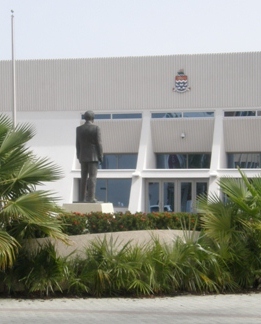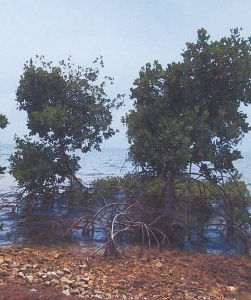Archive for September 4th, 2012

Government begins drive to collect $650M
 (CNS) Members of the public and the business community will all need to dig deep over the remaining ten months of this financial year as the government seeks to raise a further 20% in revenue from the local economy. Despite the continued downturn and economic difficulties faced by many businesses, particularly small enterprises and local retailers, the government is hoping to squeeze the most cash from the community in the history of the Cayman Islands in order to cover the cost of government and to return a significant surplus. The government is in the process of amending laws and regulations to allow it to collect some $90 million more in fees.
(CNS) Members of the public and the business community will all need to dig deep over the remaining ten months of this financial year as the government seeks to raise a further 20% in revenue from the local economy. Despite the continued downturn and economic difficulties faced by many businesses, particularly small enterprises and local retailers, the government is hoping to squeeze the most cash from the community in the history of the Cayman Islands in order to cover the cost of government and to return a significant surplus. The government is in the process of amending laws and regulations to allow it to collect some $90 million more in fees.
Although the country’s financial services sector will bear the greatest burden, new fees for boats, extra duty on tobacco and alcohol, as well as work permit, stamp duty and planning fee increases and a rise in tourism taxes will impact a wider cross-section of the community.
According to the annual plan and estimates, despite the economic difficulties facing the local economy, government hopes to boost revenue collection from the offshore industry by some $60 million, while it hopes to raise more than $13 million extra in duties compared to last year and close to $10 million more in work permit fees.The tourism sector will also be coughing up another $5 million in accommodation and departure taxes.
In total government will collect over $590 million in coercive revenue — duties, taxes and fees — and will collect the remaining $60 million from entity revenue.
With government unable to borrow and with no supplementary appropriations allowed as a result of the agreement with the FCO and its conditional budget approval, government will be heavily dependent on producing the revenue measures which will produce the projected $82 million surplus.
For the first time government has based its earning projects on a 75% rate of compliance rather than a 100% compliance expectation, as it had in the past. This means that government anticipated that it will be able to collect three quarters of the fees it has mandated, placing it in a better position than in previous years.
However, the government has based its assumptions on a predicted growth during this financial year of some 2.3% in GDP and a fall in the unemployment rate of three points to 5.9% against the backdrop of a world economy predicted to grow by less than 2%.

LA silent in Mac’s absence
 (CNS): Despite having a packed legislative agenda for the remaining seven months of this parliamentary term, the Legislative Assembly was silent again on Monday after the House was adjourned by the premier on Friday evening before he left the islands. The country’s leader is understood to be overseas but there has been no official report about where or why he is currently travelling or whether he has taken personal leave or is away on government business. Ezzard Miller, the independent member for North Side, said he was unaware of where the premier was or the reason for his departure and wondered why his whereabouts had to be an official secret.
(CNS): Despite having a packed legislative agenda for the remaining seven months of this parliamentary term, the Legislative Assembly was silent again on Monday after the House was adjourned by the premier on Friday evening before he left the islands. The country’s leader is understood to be overseas but there has been no official report about where or why he is currently travelling or whether he has taken personal leave or is away on government business. Ezzard Miller, the independent member for North Side, said he was unaware of where the premier was or the reason for his departure and wondered why his whereabouts had to be an official secret.
“We have not been told where he is or why he is off-island,” said Miller, referring to himself and other members of parliament. “We should be told where he is, what he is doing and when he will return if he is on government business. If he is on personal leave, then fine, he has no need to tell us what he will be doing but he needs to tell us who will be acting premier while he is gone and for how long.”
Although CNS has submitted questions to the premier’s office regarding the premier’s latestdeparture, we are still awaiting a response.
Although bills have been left on the order paper, Miller said the Legislative Assembly was adjourned for a date still to be fixed, which, he said, essentially concluded the budget meeting and will now require government to carry over the outstanding business, which includes the much anticipated National Pensions Bill, and start a new meeting.
Miller pointed to the packed legislative agenda government is currently facing, the numbers of outstanding parliamentary questions and motions from the opposition benches, as well as a significant number of issues that government needs to address sooner rather than later.
The North Side representative noted the need for government to pass the Framework for Fiscal Responsibility agreement with the UK into law, the settling of the issue regarding the three additional parliamentary seats and the need to address the law as set out in the Boundary Commission, as well as a catalogue of legislation that is set out in this year’s budget document.
“Given the circumstances, it is not acceptable for the premier to disappear into thin air,” he said. “The trouble with this incompetent UDP government is that it seems incapable of working to any kind of plan, so all of us are constantly left in the dark,” Miller added, referring to the management of the Legislative Assembly.
According to the recently published Annual Plan and Estimates, between now and next March when the House will be prorogued in preparation for the May 2013 election, the government intends to bring some two dozen pieces of legislation as well as a significant number of new and changes to existing regulations for a number of different laws.
From the long anticipated and much awaited National Conservation Law to the overdue amendments to the Freedom of Information Law, as well as legislation to support the constitution, the government will need to find significant time for the legislative body to sit if it is to complete its proposed legislative plans.

Proposed new privacy law open for comment
 (CNS): The Cayman public now has two months to examine and review critical draft legislation regulating the collection and use of personal data by all businesses, organisations and government entities. The new bill also deals with the individual right of people to access their own personal information and have more control over how it is used. The draft Data Protection Bill 2012 aims to provide legal protection of individual rights without being overly-bureaucratic, officials said this week, as the long awaited proposed law was published for public review. David Archbold, of the Information and Communications Technology Authority, said the bill will have tangible benefits for the Cayman Islands and be an effective tool to advance the right to privacy.
(CNS): The Cayman public now has two months to examine and review critical draft legislation regulating the collection and use of personal data by all businesses, organisations and government entities. The new bill also deals with the individual right of people to access their own personal information and have more control over how it is used. The draft Data Protection Bill 2012 aims to provide legal protection of individual rights without being overly-bureaucratic, officials said this week, as the long awaited proposed law was published for public review. David Archbold, of the Information and Communications Technology Authority, said the bill will have tangible benefits for the Cayman Islands and be an effective tool to advance the right to privacy.
Archbold who was chair of the group established back in 2009 to begin the process of formulating the law urged all members of the public as well as companies, professional associations and civil society groups to become familiar with the proposals and provide feedback.
“Data Protection affects everyone and the Working Group seeks to present a comprehensive Bill to Cabinet that suits the needs of the Cayman Islands while meeting international standards. Some practical issues and implications have already been identified but we are very interested in hearing from individuals and specific business sectors that expect any additional areas will be particularly challenging.”
Officials said that the members of the Data Protection working group who were drawn from both public and private sector organisations to work on the legislation came up with a draft which should not be over burdensome on government or the private sector but at the same time promotes best practice.
The collection and use of personal data is essential to the functioning of modern society and although the working group believes many businesses and organisations will already be in compliance with the provisions of the proposed legislation, the bill seeks to provide a minimum standard for protection of personal data.
“The scope of the draft Bill is quite broad, with exemptions in the public interest or for the protection of other rights and freedoms,” government officials said in a release.
The 69 page draft Data Protection Bill 2012 and the accompanying consultation papers are available at www.dataprotection.ky and in hard copy from the Government Administration Building at 133 Elgin Avenue. Members of the public are asked to provide comments by Friday, 2 November 2012 and can call 244 3607 for more information.

Catholic church uses Facebook to recruit
 (BBC): The Diocese of Charleston in the US state of South Carolina has implemented a comprehensive social media strategy in the hope of attracting young people to the seminary, primarily targeting users of Facebook, Twitter and Foursquare. Led by Rev Jeffrey Kirby, vicar of vocations for the diocese, the aim of the plan is to encourage individuals to join the priesthood by using social media websites and mobile apps to explain what life is like for members of the clergy. "In light of recent history of the Catholic Church in the United States with scandals, social media allows the church in a unique way to be completely transparent," Kirby said.
(BBC): The Diocese of Charleston in the US state of South Carolina has implemented a comprehensive social media strategy in the hope of attracting young people to the seminary, primarily targeting users of Facebook, Twitter and Foursquare. Led by Rev Jeffrey Kirby, vicar of vocations for the diocese, the aim of the plan is to encourage individuals to join the priesthood by using social media websites and mobile apps to explain what life is like for members of the clergy. "In light of recent history of the Catholic Church in the United States with scandals, social media allows the church in a unique way to be completely transparent," Kirby said.
The number of priests in the US has dropped by about a third in the past 50 years.

Studies find little health benefit in organic food
 (BBC): Eating organic food will not make you healthier, according to researchers at Stanford University, although it could cut your exposure to pesticides. They looked at more than 200 studies of the content and associated health gains of organic and non-organic foods. Overall, there was no discernible difference between the nutritional content, although the organic food was 30% less likely to contain pesticides. Critics say the work is inconclusive and call for more studies. The research, published in the journal Annals of Internal Medicine, looked at 17 studies comparing people who ate organic with those who did not and 223 studies that compared the levels of nutrients, bacteria, fungus or pesticides in various foods – including fruits, vegetables, grains, meats, milk and eggs.
(BBC): Eating organic food will not make you healthier, according to researchers at Stanford University, although it could cut your exposure to pesticides. They looked at more than 200 studies of the content and associated health gains of organic and non-organic foods. Overall, there was no discernible difference between the nutritional content, although the organic food was 30% less likely to contain pesticides. Critics say the work is inconclusive and call for more studies. The research, published in the journal Annals of Internal Medicine, looked at 17 studies comparing people who ate organic with those who did not and 223 studies that compared the levels of nutrients, bacteria, fungus or pesticides in various foods – including fruits, vegetables, grains, meats, milk and eggs.
None of the human studies ran for longer than two years, making conclusions about long-term outcomes impossible. And all of the available evidence was relatively weak and highly variable – which the authors say is unsurprising because of all the different variables, like weather and soil type, involved.

Blood sugar link to brain shrinkage scientists find
 (CNS): People who have a blood sugar level on the higher end of the normal range may still be at risk of brain shrinkage that occurs with aging and diseases such as dementia, according to new research published in Neurology, the medical journal of the American Academy of Neurology. A press release from the academy on Thursday revealed that in a study involving 249 people age 60 to 64 who had blood sugar in the normal range as defined by the World Health Organization those with a higher fasting level but still in the normal range were more likely to have a loss of brain volume than those in the lower range.
(CNS): People who have a blood sugar level on the higher end of the normal range may still be at risk of brain shrinkage that occurs with aging and diseases such as dementia, according to new research published in Neurology, the medical journal of the American Academy of Neurology. A press release from the academy on Thursday revealed that in a study involving 249 people age 60 to 64 who had blood sugar in the normal range as defined by the World Health Organization those with a higher fasting level but still in the normal range were more likely to have a loss of brain volume than those in the lower range.
"Numerous studies have shown a link between type 2 diabetes and brain shrinkage and dementia, but we haven't known much about whether people with blood sugar on the high end of normal experience these same effects," said study author Nicolas Cherbuin, PhD, with Australian National University in Canberra.
The study revealed that those with higher fasting blood sugar levels within the normal range and below 6.1 mmol/l (or 110 mg/dL) were more likely to have a loss of brain volume in the areas of the hippocampus and the amygdala, areas that are involved in memory and cognitive skills, than those with lower blood sugar levels. A fasting blood sugar level of 10.0 mmol/l (180 mg/dL) or higher was defined as diabetes and a level of 6.1 mmol/l (110 mg/dL) was considered impaired, or prediabetes.
After controlling for age, high blood pressure, smoking, alcohol use and other factors, the researchers found that blood sugar on the high end of normal accounted for six to 10 percent of the brain shrinkage.
"These findings suggest that even for people who do not have diabetes, blood sugar levels could have an impact on brain health," Cherbuin said. "More research is needed, but these findings may lead us to re-evaluate the concept of normal blood sugar levels and the definition of diabetes."
Traffic law expected to be enforced next week
(CNS): Although there has been no confirmation from government officials in the ministry regarding the date when the traffic law, which was passed last November, will come into force, Mike Adam made an announcement last week that Cabinet had approved the regulations. Speaking at the opening night of Cayman’s first electric car show on Thursday, the community affairs minister, who was standing in for the premier, said that the law would come into effect in two weeks. Although this is good news for local business man John Felder, its spells bad news for clamping firms and a warning for drivers who have not yet purchased a hands free mobile phone kit.
Despite the revelations by the minister, the regulations have not yet been madepublic and, among many other key issues, the level of fines for people using their phones while driving have not been revealed. If the minister is correct that the law will come into force around the 10 September, this does mean that before the month is out electric cars will finally be allowed on Cayman’s roads.
Local businessman John Felder, the man who has been relentless in his goal to populate Cayman’s roads with green vehicles, told CNS on Monday that he was delighted With many false alarms over the years, Felder has been waiting a long time for this day.
“Now for the first time, Caymanians will be able to have the option to drive an eco-friendly vehicle that will not pollute the environment,” he said. “Petroleum is a limited resource, a vexing source of price spikes, geopolitical instability, and environmental disasters of epic proportions.”
Felder, who owns Cayman Automotive, the only current supplier of electric vehicles in Cayman, said that these eco-cars would be essential to the development of a cleaner, more independent transportation system in Cayman. Felder had taken a significant business risk as he began the process of importing electric vehicles into Cayman several years ago, even though they could not be driven on local roads, in anticipation of a long promised government commitment to changing the law. He also began the process of introducing solar panelled charging stations, which he hopes to roll out across Grand Cayman in the coming months so that electric car drivers can also make the use of truly green energy.
The new traffic law was passed with cross party support in the Legislative Assembly last November. However, despite the excitement this week that Felder’s dream would be a reality, the regulations have not yet been published and no official date has been set. CNS has contacted the ministry to confirm the start date for the law and details of the regulations and is awaiting a response.
See 2011 Traffic Law here.

Cop car smashes into home in Bodden Town
 (CNS): A police car on routine patrol Friday night smashed into a house in the district of Bodden Town in a single vehicle crash. An RCIPS spokesperson said the officer who was slightly injured in the accident has been suspended from driving from police cars but not suspended from duty. The crash occurred at about 11.40 pm on Friday, night (31 August) when the officer was driving a marked police vehicle in Shamrock Road near to Manse Road. The officer was heading east on routine patrol duties when the vehicle crossed onto the westbound carriageway and then crashed into a building. The officer was taken to the Cayman Islands Hospital in George Town and released following treatment.
(CNS): A police car on routine patrol Friday night smashed into a house in the district of Bodden Town in a single vehicle crash. An RCIPS spokesperson said the officer who was slightly injured in the accident has been suspended from driving from police cars but not suspended from duty. The crash occurred at about 11.40 pm on Friday, night (31 August) when the officer was driving a marked police vehicle in Shamrock Road near to Manse Road. The officer was heading east on routine patrol duties when the vehicle crossed onto the westbound carriageway and then crashed into a building. The officer was taken to the Cayman Islands Hospital in George Town and released following treatment.
Police stated that the car which was a Dodge Charger was extensively damaged in the crash.
“In line with normal RCIPS policy, the officer has been suspended from driving police vehicles pending the outcome of the investigation into the crash,” the RCIPS spokesperson stated Tuesday.

Cubans brought to Cayman following sea rescue
(CNS): The police helicopter was on the front line in another major rescue operation after a group of Cuban refugees aboard a 20 foot sailing boat got into difficulties some 40 miles south east of Grand Cayman. At around 3.50pm on Monday, 3 September, the RCIPS police helicopter was on routine maritime patrol when the crew saw and investigated the sailing boat, which was drifting in the water with nine people on board. The occupants were seen to wave a white flag and they had no radio communications. A police spokesperson said that through signing the helicopter crew established that the boaters needed assistance.
Due to the distance from shore, the RCIPS helicopter crew identified the MV Emma Bulkers, a tanker which was around ten miles away. The helicopter crew established radio contact with the captain and requested that the tanker render assistance to the Cubans. The tanker was guided to the sailing vessel, and all nine people, who appeared to be in good health, were taken on board the vessel, which then continued to head towards Grand Cayman.
The Joint Marine Unit’s boat, The Cayman Guardian, with police, customs and immigration officers on board, deployed and met with the tanker. The Cubans were transferred to the Guardian which arrived at the Royal Watler terminal in George Town on Monday night and was met by immigration officials, who will process the Cubans before deporting them back to the neighbouring island.

South Sound mangrove threat
 (CNS): The Central Planning Authority (CPA) has once again given permission to a project that will allow a developer to remove critical recovering mangrove buffer. Despite recommendations from the environment and the planning departments against the application, the CPA have given the nod to RC Estates to remove 50 feet of recovering buffer that runs 2,000ft along the coastal lots of a proposed development in the South Sound. The developer will be filling the area with marl and extending the lots into the ocean, which is also a marine replenishment zone. Both environmental activists and residents in the area said they were bitterly disappointed by the decision which will place not only the newly replenished mangrove under threat but the local marine environment as well.
(CNS): The Central Planning Authority (CPA) has once again given permission to a project that will allow a developer to remove critical recovering mangrove buffer. Despite recommendations from the environment and the planning departments against the application, the CPA have given the nod to RC Estates to remove 50 feet of recovering buffer that runs 2,000ft along the coastal lots of a proposed development in the South Sound. The developer will be filling the area with marl and extending the lots into the ocean, which is also a marine replenishment zone. Both environmental activists and residents in the area said they were bitterly disappointed by the decision which will place not only the newly replenished mangrove under threat but the local marine environment as well.
The CPA met on 15 August to consider RC Estates application to modify an approval from 2003. The original plan had provided for the developer to build a seawall at the inner edge of the 50ft mangrove buffer. The seawall was approved but it was conditional on the developer leaving the mangroves in place.
However, the applicants asked for an amendment to move the seawall location as indicated in plans submitted to the CPA and to remove the condition to retain the mangrove buffer. They claimed the mangrove was damaged and in other instances in the area developers had not been required to retain a mangrove buffer. The CPA approved the change, which means the buffer can be removed and the developer now has the green light to fill in the area and build a 9ft concrete sea wall.
Although the area was damaged by Ivan, the Department of Environment (DoE), with assistance from the US Fish and Wildlife Service, the Migratory Bird Conservation and Reef Ball Foundation, has invested time, energy and public resources into the replenishment of the buffer, which was beginning to grow back.
During the recent hearing the DoE presented extensive evidence of the recovery to the CPA and listed a catalogue of environmental issues relating to the removal of the recovering buffer as well as the importance of continuing to replenish the area and not remove more. The DoE also pointed to the sensitivity and significance of the area as a Marine Replenishment Zone and as a protected Scenic Coastline Zone.
The planning department also advised against the removal of the mangrove, pointing out that the preservation of mangrove buffer at the high-water mark was best planning practice. “From Department’s perspective, the 50’ buffer should be retained,” the planning department said in its recommendations
The Development Plan (1997) designates this area as being a ‘Scenic Coastline Zone’ and Section 20 of the Development and Planning Regulations (2006 Revision) requires the CPA to ensure that the open character of scenic coastline land is preserved and to safeguard the public’s right to use the beaches and to gain access to them through public rights of way. In addition, the plan states that “the panoramic views and vistas provided by these coastlines are natural assets which are to be safeguarded for present and future generations.”
Despite the recommendations from the two government departments, the CPA said it was swayed by the presentation given by the applicant’s lawyer that the owners had a legal right to develop the land. The attorney argued that his client’s land had a fixed boundary, which the sea had eroded, but it was still his client’s boundary.
The argument comes in thewake of a recent report pointing to the critical significance of mangroves in arresting storm surge among many other benefits.
The CPA has given permission to the removal of mangrove buffer on other occasions, most significantly the removal, more than two years ago of over 350,000 sq ft of mangrove buffer at the North Sound on the land belonging at the time to the Ritz Carlton developer, Michael Ryan.
Officials from the DoE have lamented the failure of the mangrove buffer designation to protect this critical habitat and has stated several times this is one more reason why the country is in desperate need of a National Conservation Law, which would ensure environmental considerations are paid more than mere lip service in the face of development.
With the newly recovering mangrove now under serious threat, activists in the area are calling on the wider community to help preserve the buffer. They are asking people to write letters and submit comment to the media, and to the Minister of the Environment Mark Scotland as well as other members of Cabinet. The campaigners are also asking for volunteers to help with legal, marketing and other expertise, or to donate to the Protect South Sound fund.
For more details on the campaign contact protectsouthsound@gmail.com
See CPA minutes here